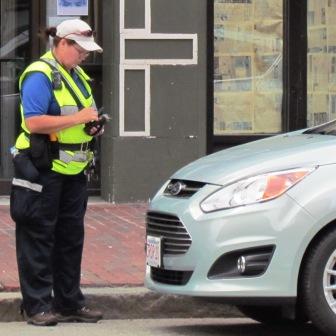
Parking tickets – one of the nightmares of having a car in the city.
People filing chapter 7 bankruptcies find tickets can be like a bad movie, they just won’t go away.
Here’s the problem: The U.S. Congress enacted the bankruptcy code, so we can’t be surprised that the law protects many units of the government. One of many examples is student loans. Such loans, backed by the federal government, are rarely dischargeable unless extreme circumstances legally categorized as ‘undue hardship’ are proven to a bankruptcy judge.
Parking Tickets and Bankruptcy
The provision of bankruptcy law giving parking tickets life after chapter 7 is the section stating what debts are discharged, and which are not. This section of the law excludes debts from discharge
“to the extent such debt is for a fine, penalty, or forfeiture payable to and for the benefit of a governmental unit”.
U.S. Bankruptcy Code. 11 U.S.C. § 523(a)(7).
So, the common view is that parking tickets survive Chapter 7. The only good news here is that the city or town may not push the collection while the chapter 7 case is open. The stay of bankruptcy stops collection as long as the case is pending.
Sometimes a valid argument is made that if the parking ticket is not a fine, and is subject to civil enforcement only as a revenue measure rather than a police power matter, then it would be discharged.
Practical Matter – Pay the Tickets?
Meanwhile, if you fail to pay the ticket, there is the possibility a bench warrant could issue, and next time you get stopped for a broken tail light or anything else, you could have problems. Unless the ticket is for a high amount, as a practical matter, it might be best to pay it.
Parking Tickets in Chapter 13 Bankruptcy
So far the focus has been on chapter 7 bankruptcy. But, parking tickets can be discharged in a Chapter 13. Here, municipal fines including parking tickets are considered unsecured debt. They are treated like all other unsecured debts. For example, if the chapter 13 plan requires payment of ten (10%) per cent of unsecured debt and you have $150 in parking tickets, you’ll pay $15 towards the tickets. After all plan payments are made and the discharge is issued, the remaining amount of the tickets goes away.
Deciding whether chapter 7 or chapter 13 is best, or whether any bankruptcy filing is a viable alternative depends on many factors. My office handles consumer bankruptcies in Massachusetts and New Hampshire. In those two states, call for a free consultation.
Views: 22





I wanted to know if I can file bankruptcy for a ticket I can’t pay right now.
See an experienced bankruptcy attorney in your jurisdiction. The answer depends on the type of ticket and the rules in your state. Sometimes it works in the states in which I’m licensed: NH & MA.
Depends on the type of ticket. Whether or not bankruptcy is a good option for you overall, based on the facts and circumstances of your finances, is a decision you should make only after consultation with an experienced knowledgeable bankruptcy attorney in your jurisdiction.
I wish you the best.
Can new tickets be added to a bankruptcy you are currently paying on?
Cristiana –
Unfortunately, no. The bankruptcy discharge will only wipe out any debt that was existing at the time of the filing and before, not after the case is filed.
If your license has been suspended due to parking tickets and you are filing Chapter 7 for add’l debt, will the license be reinstated, or will you still have to pay the fines.
Debra-
It depends on the type of ticket but most civil violation fines are in fact discharged. The answer to your question is highly dependent on your jurisdiction but I have in fact done this for my clients. So, it is worth your while to consult an experienced bankruptcy attorney in your jurisdiction.
I’f a vehicle is ticketed due to expired tags after chapter 7 has been filed on it but before the bankruptcy is finalized, who is responsible for the ticket?
Dear Kristy;
The owner of the vehicle is responsible for the ticket issued after the chapter 7 bankruptcy is filed. The way a chapter 7 bankruptcy works is that all debt up to the moment of filing the petition is “stayed” by the filing. Then, if all goes normally, at the end of the case a discharge is issued which wipes away the legal obligation to pay any of the pre-filing debt that has been stayed. Any debt filed after the filing is untouched. Bankruptcy attorneys call it post-petition debt. Sorry.
My office files chapter 7 and chapter 13 consumer bankruptcy cases in Massachusetts and New Hampshire.